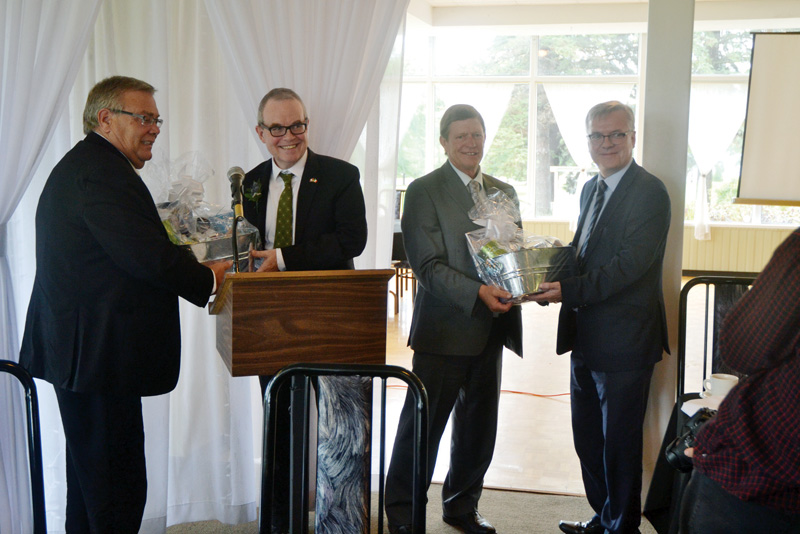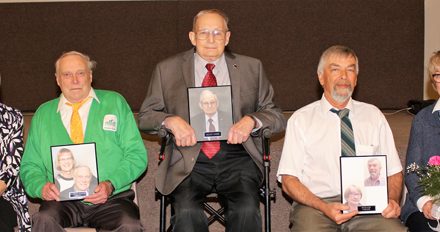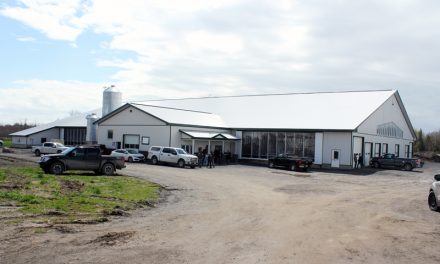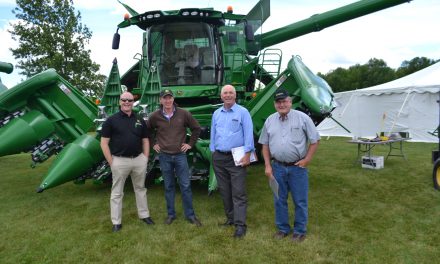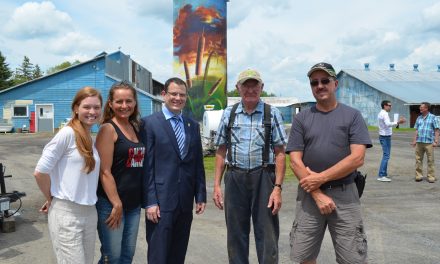Many thanks
Members of council presented Irish ambassador Jim Kelly (second from left) and his chief of staff Michael Hurley (far right) with gifts after the breakfast meeting at Cornwall Golf and Country Club on Sept. 8. Sawyer Helmer photo

Irish ambassador Jim Kelly spoke with Grant’s Dairy Farm producer Rod Grant (right) during the farm tour portion of Kelly’s official visit to SDG, Cornwall and Akwesasne. Sawyer Helmer photo
by Kalynn Sawyer Helmer
AgriNews Staff Writer
CORNWALL – On Fri., Sept. 21, SDG, Cornwall and Akwesasne councils welcomed Irish ambassador Jim Kelly and his chief of staff Michael Hurley to a breakfast meeting and tour of the local area. The visit was organized primarily by Eleanor McGrath and showcased the potential for growth in the region both domestically and internationally.
The breakfast meeting was held at the Cornwall Golf and Country Club with traditional Irish breakfast options. Before and after the breakfast, the ambassador and local delegates toured the Cornwall Jail, St. Lawrence River, St. Lawrence College and Grant’s Dairy Farm.
The farm tour was a first for the ambassador having never before seen a Canadian operation up close. The fairly new barn along Boundary Road features three Lely milking robots that milk 180 cows in a free-stall barn. The farm houses 400 cattle in total with some out for pasture while the others remain indoors. Rod Grant and his son Alex also farm 1,000 acres of cash crop and roughly 200 for feed. Rod told ambassador Kelly the average production for their milking cows is about 40 litres per cow per day.
What was interesting for the ambassador, was seeing the advancements of robotics and technology alongside the large scale featured on many Canadian farms. Kelly drew parallels between the countries, noting that Ireland is moving to larger productions with the help of technology. He continued that while the countries do see some openings from CETA for food products, there may be more opportunities in the business and technology sectors of agriculture.
“We will see Irish agriculture producers take an interest in the cheese quota in particular and there was also interesting in having butter as well, but there wasn’t an open for that in CETA. But another area where there is a great deal of interest and a certain amount of activity going on is in the agri-tech side,” Kelly said. “We have quite a big agri-tech sector, machinery and technology, and a number of those companies I believe are active here in Canada. CETA will certainly make it more of a proposition for them in terms of ease of business. A lot of the practical stuff about moving workers back and forth and about the acceptance of qualifications as far as entry on the softer side as well makes it more of a proposition for the companies to look at doing more of their business here. Particularly companies that are very heavily concentrated on the UK market are looking to diversify into other markets and Canada is very compatible in that regard.”
Other areas in agriculture open between Canada and Ireland could be in education. Ambassador Kelly spoke to the importance of education exchanges across the board but recognized that in agriculture there were opportunities. “Agribusiness is still really important to the Irish economy and there is a great deal of expertise and experience there. I’m sure there is a great deal that we can learn from each other,” said Kelly.
While touring the farm and speaking with Grant, it was interesting for Kelly to get a sense of Canadian agriculture. He explained, due to the publicity of the NAFTA renegotiations, the issue of supply management is something he has followed quite closely. “In some ways they mirror the more historical discussions in Ireland and the European Union about how supplies manage there. There has been a lot of reforms to the common agricultural policy in the European Union and a lot of the surpluses that were problematic in the social sense have been dealt with. It’s interesting to observe at a ground level what it means to talk to a Canadian farmer and what changes to the supply management system might mean for the economics of their business. It is a very real issue for people trying to make a living,” he explained.
Despite having such a short visit to the region, Kelly looked forward to the growth and future of a relationship between SDG, Cornwall and Akwesasne with Ireland.

